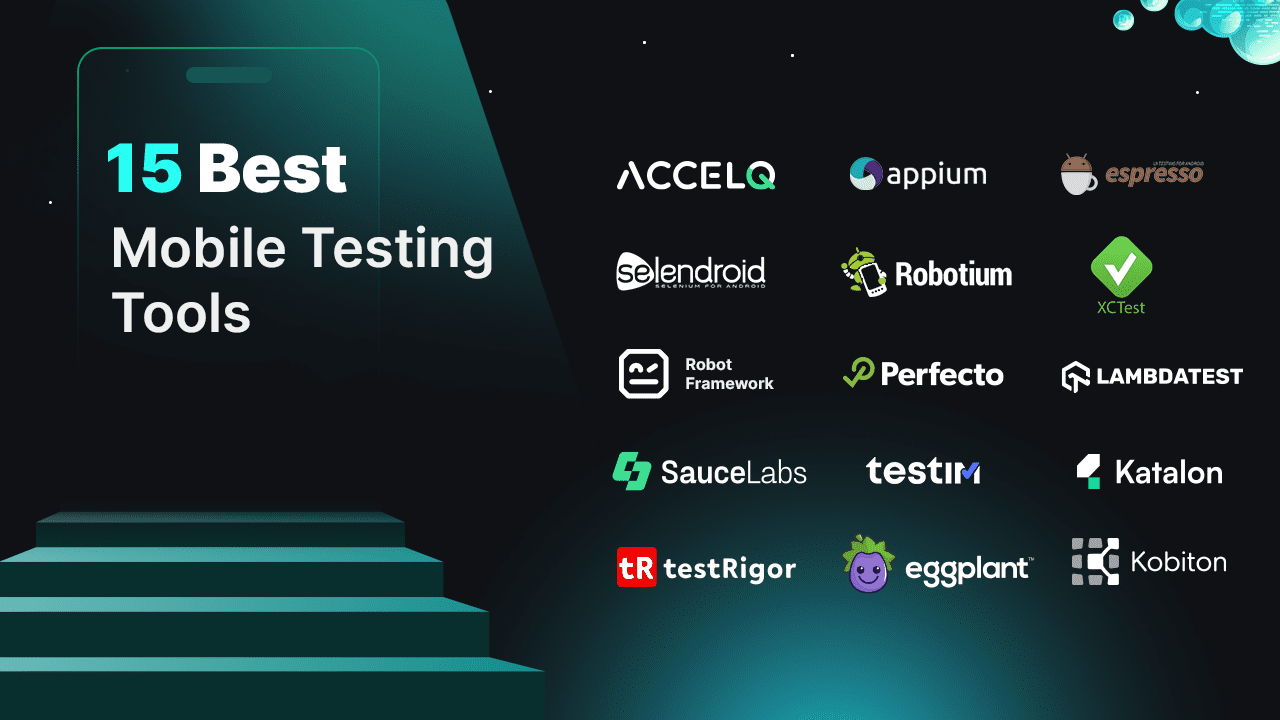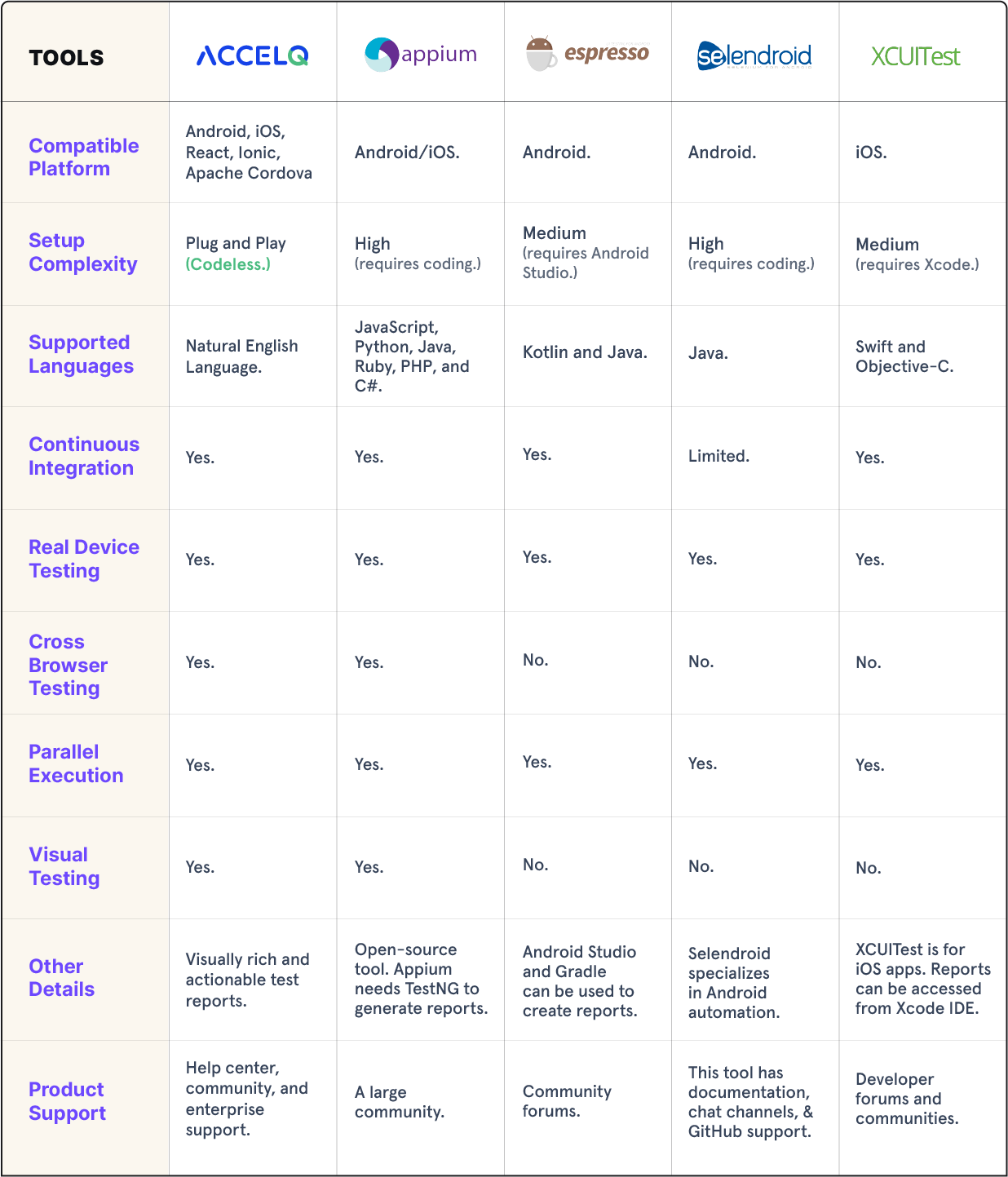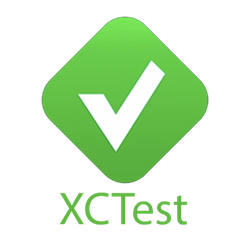15 Best Mobile Testing Tools (2024 edition)

According to the Compound Annual Growth Rate, global mobile users will be approximately 1.78 billion by 2028. With the demand for mobile devices, developers and testers work tirelessly to satisfy user needs. They aim for stable network connections, app functionality post-updates,etc.
The goal is not only to address individual needs but also to secure profitable returns for their organizations. In this ever-evolving tech landscape, employing proper testing tools is essential.
This blog will highlight the twelve best tools for mobile device testing that have gained popularity in the industry for their reliability and efficacy.

TOP 15 Automation Mobile Testing Tools in 2024
1. ACCELQ

ACCELQ is a cloud-based continuous testing platform that can automate Web, API, and mobile testing in a unified flow without a single line of code. This is achieved through AI-powered technology using integrated device cloud labs for cross-device testing with error-fixing capabilities and self-healing abilities. Design and user experience are focused upon while their continuous innovative abilities help seamless mobile testing to deliver quality outcomes.
Features:
- This platform follows a functional approach while automating mobile devices. This approach enables the entire team to do the testing phase without specialists.
- It provides powerful and intelligent mobile element identification technology.
- It adopts a unified, OS-agnostic approach with a central object repository for iOS and Android.
- No coding is required, even if the mobile apps are complex and dynamic.
- This platform follows a design-first approach with inbuilt modularity and no need for custom frameworks.
- The version control, branching, and merging are all in a collaborative cloud platform.
- ACCELQ’s application universe and analytic-based algorithms drive automated test planning to ensure coverage.
- It is a smart test management platform to alert and analyze the impact of automated app changes.
- It executes across browsers and platforms on cloud or on-premises labs.
- Executed tests can be scheduled or triggered by CI workflow.
- ACCELQ integrates with popular tools such as Jenkins, TeamCity, and Bamboo to present a unified view of the quality lifecycle.
- Email notifications are sent to fit into the team’s process and enable quick decision-making.
2. Appium

Appium is an open-source mobile testing tool favored by developers and testers. It allows the creation of test cases for multiple platforms using the same API. It supports Android versions from 2.3 onwards. Appium executes test cases using the WebDriver interface. WebDriver automates web testing by clicking buttons and entering text on pages.
Features:
- It is a testing tool to automate mobile, web, native, hybrid, and desktop apps.
- This tool was used to automate Android and iOS mobile applications. Now, with Webdriver, it can automate even desktop platforms.
- It performs mobile app testing into existing CI/CD pipelines for logical automation.
- Plugins have been added exclusively to Appium 2 to extend server functionality without changing the server code.
- Appium Inspector allows visual debugging of automated tests and could be helpful for beginners.
- Test scripts can be created using various programming languages: Java, Javascript, Python, Ruby, PHP, and C#.
- This tool integrates with Flutter and React native mobile development frameworks.
Website: https://appium.io/
3. Espresso

Espresso grabs a spot regarding a popular open-source testing framework specifically designed for automating the testing of Android applications.
Developed by Google, Espresso provides a simple and efficient way to write UI tests for Android apps, enabling developers and QA teams to ensure the quality and reliability of their applications.
Features:
- This tool integrates with Android’s primary development tool, Android Studio, making creating and running tests easier.
- With Espresso-Intents, testers can test if the app behaves correctly when moving from one screen to another.
- This tool can be integrated into CI pipelines for automated testing.
- Espresso enables the development team to test both Android and hybrid web platforms.
- Test cases using this tool can be performed in Java or Kotlin.
Website: https://developer.android.com/training/testing/espresso
4. Selendroid

Selendroid is a mobile test automation framework that focuses on automating the UI of Android native, hybrid applications, and mobile web applications. It leverages the Selenium 2 client API to write tests and interact with the user interface of applications.
Features:
- This framework can be used to test both native and hybrid Android applications.
- Selendroid includes a built-in inspector to simplify the process of writing automation scripts. There’s no need to modify or recompile your application to automate it.
- UI Element Inspection checks the current UI elements of the app to perform a simple test script development.
- This framework supports testing on multiple devices simultaneously.
- It can simulate user gestures like touch, swipe, drag, and drop.
Website: https://selendroid.io/
5. Robotium

When looking for a mobile testing tool that provides a simple yet robust way to write automated UI tests for Android apps, Robotium fits in prospect.
It allows developers and QA teams to ensure the quality and reliability of their applications.
Features:
- Robotium excels in black-box testing, enabling testers to write functional, system, and acceptance test scenarios.
- It integrates with Android Studio, the primary IDE for Android development, making it easy to write and run tests.
- Robotium Recorder allows the recording of a test case in minutes.
- This tool requires a minimal knowledge of the application under test.
- This tool tests mostly native and hybrid Android apps.
Website: https://github.com/RobotiumTech/robotium
6. XCUI Test

XCUI Test is Apple's native testing framework for automating the testing of iOS applications. It offers a range of features to ensure top-notch quality and reliability. It is tailored for testing iOS applications, allowing developers to write tests using Swift or Objective-C.
Features:
- XCUI Test can be integrated into CI/CD pipelines using Xcode Server or other CI tools, enabling automated testing.
- Supports testing on both real iOS devices and simulators, enabling comprehensive test coverage.
- XCUI Test has a vast assertion library for validating UI elements and their properties.
Website: https://developer.apple.com/documentation/xctest/
7. Robot Framework

This dynamic and extensible open-source platform revolutionizes how you create and execute tests across multiple platforms.
It offers a concise syntax, benefitting non-programmers to create and manage test cases effectively.
Features:
- Robot Framework uses a keyword-driven testing approach. This approach makes it easy to write tests that are understandable and maintainable.
- It supports various libraries like AppiumLibrary, designed explicitly for mobile testing. Hence, it enables the automation of Android and iOS applications.
- Robot Framework is highly customizable and can be extended with Python or Java to meet specific testing needs.
- It allows for data-driven test cases, making testing different scenarios with various data sets easier.
- With a wide range of plugins and integrations, this platform enhances capabilities for mobile testing.
Website: https://robotframework.org/
8. Eggplant

Keysight's Eggplant is one of the automation mobile testing tools developed by TestPlant. It involves machine learning (ML) and artificial intelligence to shift from manual to automated testing for rapid mobile application release. The AI-driven approach of this tool utilizes scriptless models and analytics.
Features:
- This tool uses optical character recognition (OCR) and computer vision for UI testing.
- Eggplant conducts mobile application testing using a low-code approach. It ensures high-quality user experiences across all devices.
- It comprehensively views application performance across cloud services, mobile devices, and desktops.
- Eggplant integrates with CI/CD tools like Azure DevOps and GitHub Actions to automate testing.
- This tool supports testing across various platforms, ensuring applications work logically on different devices and operating systems.
Website: https://www.keysight.com/us/en/cmp/2023/eggplant-test-automation.html
9. Katalon

Katalon is a modern, comprehensive quality management platform that helps teams of any size deliver good digital experiences. Katalon Studio eliminates building a test automation framework from scratch and programming prerequisites with low-code methods.
Features:
- This tool performs image-based testing to capture and locate visual elements. Image-based testing recognizes and interacts with an app’s buttons or icons.
- With a mobile recorder, this tool generates tests. Automatically store all UI elements for reuse purposes.
- Tests can be executed locally and remotely with real devices, simulators, or cloud-based devices.
- Katalon integrates with tools like CircleCI, Github, and more to reduce test maintenance efforts.
- This tool supports various languages such as JavaScript, Python, C++, and C#.
Website: https://katalon.com/
10. Kobiton

Kobiton is a mobile testing platform on the cloud through manual or automated testing. It enables developers and testers to perform testing on mobile apps. Kobiton also allows on-premise devices to form a holistic testing cloud.
Features:
- This tool supports testing across various mobile devices, ensuring compatibility and performance on operating systems.
- It provides virtual access to a wide range of real mobile devices for device-in-hand testing. This tool allows instant replay or manual tests in parallel across devices, enhancing test coverage.
- Kobiton’s session explorer and Jira integration facilitate collaboration and boost productivity.
- This tool provides tools for QA teams to build and manage mobile device labs tailored to their testing needs.
- Kobiton features an iMovie-like session explorer and Jira integration. These tools help teams collaborate, find, share insights for productivity and efficiency.
- It supports programming languages like Java, Python, NodeJS, C#, and PHP.
- This tool supports multiple frameworks and integrates with Figma, and other tools.
Website: https://kobiton.com/
11. LambdaTest

LambdaTest is an AI-powered test orchestration and execution platform that lets you run manual and automated tests at scale with over 3000+ real devices, browsers, and OS combinations. It is a continuous cloud testing platform that helps developers and testers ship code faster while ensuring cross-browser compatibility. Let us see the features of this mobile app testing tool.
Features:
- Tests native, hybrid, or web mobile apps using LambdaTest’s real device cloud. Or a virtual mobile device platform of emulators and simulators.
- This tool uses various project management tools for efficient bug tracking and collaboration.
- LambdaTest’s HyperExecute platform caches all dependencies for subsequent test runs.
- Integrates with Google Cloud and various CI/CD tools for fast tracking the delivery pipeline and launch to the market.
- The Intelligent UI Inspector of this tool relaunches an app effortlessly with a single click directly from the user interface.
Website: https://www.lambdatest.com
12. Perfecto

Perfecto is the comprehensive platform for live, automated, and continuous testing for web and mobile applications. This platform uses ML-based noise filtering to get rid of redundant data. Perfecto is scalable and can run a full regression suite in minutes.
Features:
- Perfecto supports extensive cross-platform testing on various mobile browsers and operating systems.
- This tool also offers a cloud-based mobile device lab with a vast selection of real mobile devices for testing.
- This tool supports automated testing with popular frameworks like Appium, Espresso, and XCUITest.
- Perfecto performs regression testing to detect UI anomalies. User Experience (UX) testing to simulate real-world conditions for mobile devices.
- This tool executes testing in isolated environments with mock services and synthetic test data. Through BlazeMeter’s mock services, the mobile apps confirm whether the backend functionalities are working fine and that there are no other network issues.
Website: https://www.perfecto.io/
13. Sauce labs

The Sauce DevOps test is a platform for web mobile application testing and error monitoring. They streamline the product testing process with one do-it-all service.
Features:
- This tool includes visual testing capabilities to detect UI issues and ensure visual consistency across different devices and browsers.
- The mobile beta testing using this tool can report bugs by shaking users’ devices or sketching on the screen.
- Upload and ship apps programmatically to get the latest app version into the hands of your beta testers.
- Get comprehensive crash reports with detailed logs and app metrics. These reports can be automatically posted to Jira, Slack, Trello, and other tools to trace the root cause of issues.
- This tool has a private cloud with a single database for a secure environment.
Website: https://saucelabs.com/
14. Tricentis Testim
Testim by Tricentis is an AI-powered SaaS platform that helps to write tests, minimize maintenance, and deliver products earlier. Product development teams can modernize UI functional testing with Testim Mobile across the web and mobile applications.
Features:
- Powerful multi-attribute locators identify objects better, boosting test stability. Testim uses alternate attributes to keep the test working if an application changes.
- Android and iOS devices can be tested in actual usage conditions with Tricentis Device Cloud.
- Virtual simulators for iOS and Android in a grid allow continuous testing with each check-in, identifying bugs early and improving app quality with extensive device coverage.
- Manage application versions in a central repository and ensure tests run against the correct version with the required configurations.
- Dashboards and visualization aggregate errors to diagnose the failure causes and fix issues.
- Using this tool, running the tests with each release is part of CI/CD pipelines to get feedback and know whether the mobile testing is passed or failed.
Website: https://www.testim.io/
15. testRigor

testRigor is an AI-powered system that dramatically reduces test maintenance and autonomously generates tests that reflect end users' behavior. This system incorporates libraries like Appium and Cypress into a more extensive database of functionality and actual user activity to test autonomously.
Features:
- This tool runs tests on multiple browsers and devices simultaneously for various sessions.
- testRigor supports mobile testing across three thousand plus combinations of browsers and devices on multiple operating systems.
- This tool supports 2FA login via email, text messages, and Google Authenticator.
- This tool allows users to generate tests based on how they use applications in their production.
- testRigor integrates with CircleCI, Azure DevOps, Jenkins, and more.
- This tool is famous for mobile operating systems like iOS and Android.
Website: https://testrigor.com/
Which one to choose and how important is it?
Choosing a mobile testing tool for our specific needs can be challenging. As a result, teams with extensive experience may rely on advanced features. While those with limited technical knowledge often prefer user-friendly and automated tools. To aid your decision-making process, we've summarized each tool. For a quick comparison, kindly refer to the above table or visit their official website for more concise information.
Automate Mobile of ACCELQ is an automated solution for mobile application testing. It completely supports testing on various mobile devices and OS in a codeless approach. A portable element design allows you to run the used tests on both iOS and Android. As such, everyone in the team can collaborate in test development and maintenance. In conclusion, we encourage you to explore the functionalities of our tool. So, seize the opportunity to book a free trial with us today and discover the testing solution that best suits your requirements.
Geosley Andrades
Director, Product Evangelist at ACCELQ
Geosley is a Test Automation Evangelist and Community builder at ACCELQ. Being passionate about continuous learning, Geosley helps ACCELQ with innovative solutions to transform test automation to be simpler, more reliable, and sustainable for the real world.
Related Posts
 Cross Browser Testing Checklist for 2024
Cross Browser Testing Checklist for 2024
Cross Browser Testing Checklist for 2024
 Does monitoring your e-commerce website bring any benefits?
Does monitoring your e-commerce website bring any benefits?


